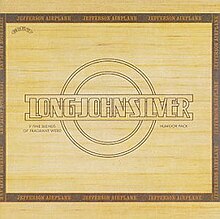Recording history
After several solo projects for Grunt Records, the members of Jefferson Airplane (Paul Kantner, Grace Slick, Jorma Kaukonen, Jack Casady, Joey Covington and Papa John Creach) came together again in March 1972 for the first time in the studio since the Bark album was released in September 1971. Sessions at Wally Heider Studios continued for nearly three months, but tensions were high and several songs were recorded by each member recording their own part separately. [5] David Crosby participated in the recording sessions, but his vocals were stripped from the record at the insistence of his label.
Joey Covington left the band during the sessions, with accounts varying over whether he was fired. Veteran session drummer John Barbata, formerly of The Turtles, and Hot Tuna's Sammy Piazza deputized for the rest of the recording process. Barbata ultimately replaced Covington, playing on all but three songs.
Recording was completed in May, 1972. Before the album's scheduled July release, RCA Records demanded that the band remove a line from the song "The Son of Jesus" electronically, which referred to a "bastard son of Jesus". [6] Live performances of the song left the line intact.

Jefferson Airplane was an American rock band based in San Francisco, California, that became one of the pioneering bands of psychedelic rock. Formed in 1965, the group defined the San Francisco Sound and was the first from the Bay Area to achieve international commercial success. They headlined the Monterey Pop Festival (1967), Woodstock (1969), Altamont Free Concert (1969), and the first Isle of Wight Festival (1968) in England. Their 1967 breakout album Surrealistic Pillow was one of the most significant recordings of the Summer of Love. Two songs from that album, "Somebody to Love" and "White Rabbit", are among Rolling Stone's "500 Greatest Songs of All Time".

Jefferson Starship is an American rock band from San Francisco, California, formed in 1974 by a group of musicians including former members of Jefferson Airplane. Between 1974 and 1984, they released eight gold or platinum-selling studio albums, and one gold-selling compilation. The album Red Octopus went double-platinum, reaching No. 1 on the Billboard 200 chart in 1975. The band went through several major changes in personnel and genres through the years while retaining the Jefferson Starship name. The band name was retired in 1984, but it was picked up again in 1992 by a revival of the group led by Paul Kantner, which has continued since his death in 2016.
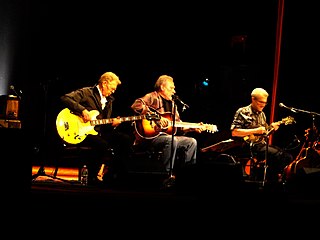
Hot Tuna is an American blues rock band formed in 1969 by former Jefferson Airplane members Jorma Kaukonen (guitarist/vocals) and Jack Casady (bassist). Although it has always been a fluid aggregation, with musicians coming and going over the years, the band's center has always been Kaukonen and Casady's ongoing collaboration.
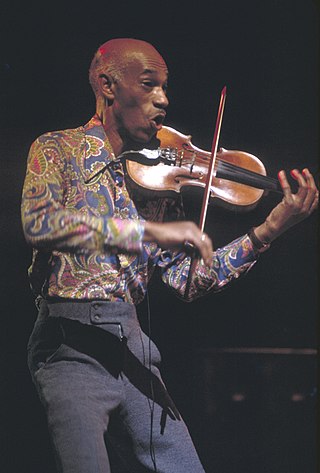
John Henry Creach, better known as Papa John Creach, was an American blues violinist who also played classical, jazz, R&B, pop and acid rock music. Early in his career, he performed as a journeyman musician with Louis Armstrong, Fats Waller, Stuff Smith, Charlie Christian, Big Joe Turner, T-Bone Walker, Nat King Cole and Roy Milton.
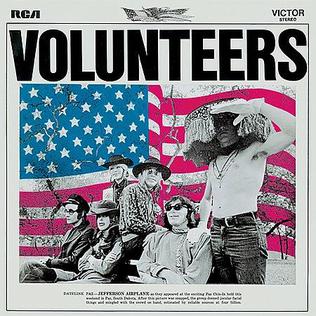
Volunteers is the fifth studio album by American psychedelic rock band Jefferson Airplane, released in 1969 on RCA Records. The album was controversial because of its revolutionary and anti-war lyrics, along with the use of profanity. The original album title was Volunteers of Amerika, but it was shortened after objections from Volunteers of America, a religious charity.

Thirty Seconds Over Winterland is an album by the American psychedelic rock band Jefferson Airplane. It was recorded live in August and September 1972, at the Auditorium Theatre in Chicago and the Winterland Ballroom in San Francisco. It was released in April 1973; reflecting the band's declining commercial stature, it only peaked at No. 52 on the Billboard chart.

Bark is the sixth studio album by American rock band Jefferson Airplane. Released in 1971 as Grunt FTR-1001, the album is one of the Airplane's late-period works, notable for the group's first personnel changes since 1966. The album was the first without band founder Marty Balin and the first with violinist Papa John Creach. Drummer Spencer Dryden had been replaced by Joey Covington in early 1970 after a lengthy transitional period in which both musicians had performed with the band.

Jefferson Airplane is the eighth and final studio album by San Francisco rock band Jefferson Airplane, released on Epic Records in 1989. Marty Balin, Paul Kantner, Grace Slick, Jorma Kaukonen and Jack Casady all returned for the album and supporting tour, though Spencer Dryden did not participate. The album and accompanying tour would mark the last time Jefferson Airplane would perform together until their 1996 induction to the Rock and Roll Hall of Fame.
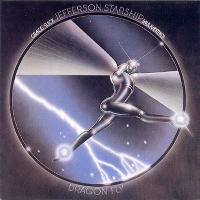
Dragon Fly is the debut album by Jefferson Starship, released on Grunt Records in 1974. It peaked at No. 11 on the Billboard 200, and has been certified a gold album. Credited to Grace Slick, Paul Kantner, and Jefferson Starship, the band itself was a turning point after a series of four albums centering on the partnership of Kantner and Slick during the disintegration of Jefferson Airplane through the early 1970s.
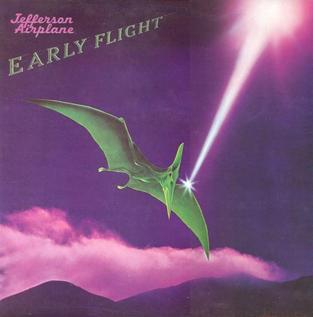
Early Flight is a 1974 compilation album by the American psychedelic rock band Jefferson Airplane, released as Grunt CYL1-0437. It features previously unreleased material from 1966, 1967, and 1970 as well as both sides of a non-album 1970 single.

Flight Log (1966–1976) is a compilation album by the American rock band Jefferson Airplane. Released in January 1977 as a double-LP as Grunt CYL2-1255, it is a compilation of Jefferson Airplane and Airplane-related tracks, including tracks by Jefferson Starship and Hot Tuna, as well as solo tracks by Paul Kantner, Grace Slick, and Jorma Kaukonen. Although primarily a compilation album, the album includes one previously unreleased song: "Please Come Back" written by Ron Nagle and performed by Jefferson Starship. "Please Come Back" is not available on any other release.

Last Flight is an authorized recording released in the United Kingdom, taken from the last live performance of the San Francisco rock group Jefferson Airplane prior to the band's dissolution in 1972. The concert was held at the Winterland Arena in San Francisco, and selected tracks were released on the 1973 album Thirty Seconds Over Winterland. Last Flight consists of the entire concert with the exception of the encore, Marty Balin's "You Wear Your Dresses Too Short", previously released on the Jefferson Airplane Loves You box-set. Balin sings lead vocals on "Volunteers" much to the surprise of the audience since he left the band in late 1970.

"Mexico" is a single released in May 1970 by San Francisco rock band Jefferson Airplane, produced by the band at Pacific High Recording Studios with Phill Sawyer as the recording engineer. Written and sung by Grace Slick, it is a tuneful rant against then-President Richard Nixon and his anti-drug initiative, Operation Intercept, that he had implemented to curtail the flow of marijuana into the United States from Mexico. The song closes with an exhortation for the young to realize the power of their numbers, as shown by the gathering of "half a million people on the lawn" at Woodstock.

Jefferson Airplane Loves You is a three-CD boxed set of recordings by the San Francisco rock band Jefferson Airplane with extensive liner notes by Jeff Tamarkin, author of the Jefferson Airplane history Got a Revolution: The Turbulent Flight of Jefferson Airplane.

Manhole is the first solo album by Grace Slick, released in 1974 by Grunt/RCA Records.

Sunfighter is a 1971 album created by Paul Kantner and Grace Slick from Jefferson Airplane. The album was released shortly after the Airplane album Bark was released, and is the second record released on the Airplane's own Grunt vanity label, distributed by RCA Records. The album features a picture of their baby daughter, China Wing Kantner, on the cover. Many Bay Area musicians perform on the album, including all of the then current lineup of Jefferson Airplane, members of the Grateful Dead, Crosby, Stills, and Nash, and the horn group, Tower of Power. This album is also the first time a 17-year old Craig Chaquico recorded with Paul Kantner and Grace Slick. He would go on to become the lead guitarist for Jefferson Starship.

Baron von Tollbooth & the Chrome Nun is a collaborative studio album by Jefferson Airplane members Paul Kantner, Grace Slick, and David Freiberg, released in May 1973.

Grunt Records was a vanity label founded in 1971 by Jefferson Airplane and distributed by RCA Records. Initially created to sign local Bay Area acts, the label later was used only for Jefferson Starship and Hot Tuna releases. The label ended use in 1987 after Grace Slick left Starship.
